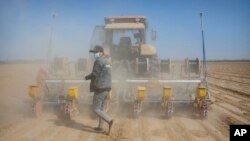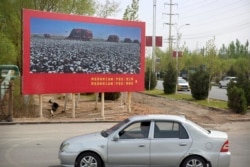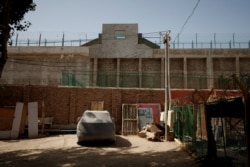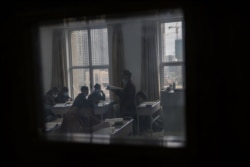On July 14, the United States Senate passed the Uyghur Forced Labor Prevention Act, intended “to ensure that goods made with forced labor in the Xinjiang Uyghur Autonomous Region of the People's Republic of China do not enter the United States market.”
The bill says that more than one million “Uyghurs, Kazakhs, Kyrgyz, Tibetans, and members of other persecuted groups” have been arbitrarily detained and subjected to “forced labor, torture, political indoctrination, and other severe human rights abuses.”
Chinese Foreign Ministry Spokesperson Zhao Lijian vehemently denied the accusation of forced labor in Xinjiang and elsewhere in China.
“China has stated its position on Xinjiang-related issues on many occasions. The accusation of ‘forced labor’ is a sheer lie,” Zhao said at a July 15 press conference.
Zhao’s claim that the accusations of forced labor are a “sheer lie” is likely false.
China’s opaque media environment and access restrictions complicate verification efforts. Likewise, as the independent U.S.-based Workers Rights Consortium noted, “the extreme levels of repression and surveillance” in Xinjiang make it a “practical impossibility” for brands and retailers to use mechanisms like labor rights audits to determine if “their supply chains are free from forced labor.”
Still, there is a growing body of evidence that forced labor is employed in the region.
The U.S. bill states that researchers and civil society groups have provided documentary evidence showing that many factories and suppliers in Xinjiang are exploiting forced labor.
For example, the Australian Strategic Policy Institute (ASPI) think tank found that at least 80,000 Uyghurs had been transferred outside of Xinjiang and assigned to factories between 2017 and 2019 in a program called “Xinjiang Aid.”
ASPI said in a March 2020 report that, using “open-source Chinese-language documents, satellite imagery analysis, academic research and on-the-ground media reporting,” it had “identified 27 factories in nine Chinese provinces that are using Uyghur labor” that is unlikely voluntary.
ASPI identified 82 foreign and Chinese companies that either directly or indirectly may have been “benefiting” from Uyghur workers who have been transferred outside of Xinjiang “through abusive labour transfer programs.”
One of those firms, the French clothing maker Lacoste, halted shipments of gloves from a factory that allegedly used forced labor.
Worker Rights Consortium executive director Scott Nova told The Associated Press that “no worker is going to tell a factory auditor that her employer and the government are breaking the law by forcing her to work against her will” in light of “the pervasive surveillance apparatus that makes a confidential conversation oxymoronic.”
Such testimonials often only come to light after former detainees have left China.
For example, Nurbaqyt Qaliasqar told Canada's Globe and Mail newspaper that his daughter, Razila Nural, spent a year in an indoctrination center before being transferred to a neighboring factory to work as a seamstress. He said she remained under a form of municipal detention and “can’t go to another city for work.”
APSI said “the threat of arbitrary detention” is a primary force preventing Uyghurs from refusing work assignments.
A study by the Helena Kennedy Center for International Justice at Britain’s Sheffield Hallam University has implicated the solar industry, noting that “Xinjiang accounts for 45% of the world’s solar-grade polysilicon supply,” with another 35% coming from elsewhere in China.
That study, titled “In Broad Daylight: Uyghur Forced Labour and Global Solar Supply Chains,” says “significant evidence – largely drawn from government and corporate sources – reveals that labor transfers are deployed in the Uyghur Region within an environment of unprecedented coercion."
According to the study, an official Chinese government document from November 2020 recorded “the ‘placement’ of 2.6 million minoritized citizens in jobs at farms and factories within the Uyghur Region and across the country through these state-sponsored ‘surplus labor’ and ‘labor transfer’ initiatives.”
However, the report stated that by collating government documents, state media reports and first person testimony from detainees and government cadres, researchers have “clearly determined” that these initiatives “are in fact mechanisms of a massive program of compulsory labor.”
“Journalists, scholars, and independent researchers who exposed this situation relied on public information – including government speeches and directives – to make their claims,” the report said.
The Sheffield Hallam University report stated that the labor transfers were "undergirded by the constant threat of re-education and internment.”
“Many indigenous workers are unable to refuse or walk away from these jobs, and thus the programs are tantamount to forcible transfer of populations and enslavement,” the report stated.
Specifically, the report noted that the Chinese Communist Party (CCP) has claimed that “terrorists, separatists, and religious extremists” attempt to thwart minorities in the region from improving “their vocational skills, economic conditions, and the ability to better their own lives.”
That has been used as a justification for labor transfers, with the work programs framed as a “strategy of anti-terrorism.”
The CCP is essentially arguing that refusal to participate in the state work programs is tantamount to supporting terrorism, separatism and religious extremism.
“First-person testimony of survivors of the camps and stories relayed through family members of released detainees who have been forced to work has indicated that participation in the programs is not voluntary for camp detainees and is coerced through threats of further imprisonment,” the Sheffield Hallam University report stated.
Both the Sheffield Hallam University report and Adrian Zenz, a scholar who has written extensively about the Uyghurs' situation, have cited the so-called Nankai Report, originally called “Work Report on Poverty Alleviation Work of Uyghur Labor Force Transfer in Hotan, Xinjiang.” It was first published in December 2019 by the China Institute of Wealth and Economics at Nankai University.
According to Zenz, the “on-site fieldwork” for the Nankai Report was directly supported by local authorities, and its researchers “participated in specially arranged interviews and discussions with high-level local government entities.”
He added that the Nankai Report’s authors had “privileged” access to government information and relevant sites which far exceeds what a regular researcher could expect.
Zenz said the Nankai Report explicitly states that China’s “eastern and central regions should have mandatory annual quotas of arranged Xinjiang laborers, which greatly helps to alleviate the shortage of laborers in [these regions] and appropriately reduces labor costs.”
The Nankai Report stated that some laborers “fettered by traditional concepts” had been “unwilling to move far away from home and have serious homesickness,’" despite “serious guiding efforts” by the Chinese government.
That led the Sheffield Hallam University researchers to conclude “[t]hese programs are not voluntarily chosen by all who are employed by them.”
These labor transfer programs “reduce Uyghur population density in Xinjiang,” showing that the “primary motivation” of such transfers “is neither poverty alleviation nor economic development,” Zenz said.
This ties into the charge that Beijing’s actions in Xinjiang amount to genocide.
China has accused Zenz of being “a far-right Christian, who is fabricating unfounded reports to slander China’s policies in Xinjiang.”
Meantime, the laborers allegedly work in prison-like conditions.
Many of the factories in which minorities from Xinjiang are working are “surrounded by razor-wire fences, iron gates, and security cameras, and are monitored by police or additional security,” the Sheffield Hallam University noted, citing Zenz.
By contrast, workers who belong to China’s Han Chinese majority can move around the workplace unrestricted and return home after work.
ASPI said that off the clock, Muslim minority workers are forced to study Mandarin, undergo “patriotic education” and prohibited from practicing their religion.
In denying the charges of forced labor, Chinese Foreign Ministry Spokesperson Zhao Lijian said: “The true intention of the U.S. moves to hype up this issue is to undermine Xinjiang's prosperity and stability and deprive the people in Xinjiang of the right to subsistence, employment and development.”
The proposed U.S. legislation states that “hundreds of thousands of ex-detainees” from persecuted minority groups may be working in conditions of forced labor following their release from what the Chinese government calls “re-education camps.”
The bill establishes a “rebuttable presumption” that any goods mined, produced, or manufactured” in Xinjiang or by certain entities were done so wholly or in part with forced labor. The importation of such goods is therefore illegal under Section 307 of the Tariff Act of 1930.
It will be up to importers to prove the goods were produced without forced labor.
The bill will next be sent to the U.S. House of Representatives for consideration.








